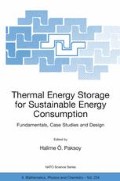Abstract
Thermal energy storage (TES) systems and their applications are examined from the perspectives of energy, exergy, environmental impact, sustainability and economics. Reductions possible through TES in energy use and pollution levels are discussed in detail and highlighted with illustrative examples of actual systems. The importance of using exergy analysis to obtain more realistic and meaningful assessments, than provided by the more conventional energy analysis, of the efficiency and performance of TES systems is demonstrated. The results indicate that cold TES can play a significant role in meeting society’s preferences for more efficient, environmentally benign and economic energy use in various sectors, and appears to be an appropriate technology for addressing the mismatches that often occur between the times of energy supply and demand.
Access this chapter
Tax calculation will be finalised at checkout
Purchases are for personal use only
Preview
Unable to display preview. Download preview PDF.
References
Dincer, I., and M.A. Rosen, 2002. Thermal Energy Storage Systems and Applications, John Wiley & Sons, London, 580 pp.
Dincer, I., 2002. Thermal energy storage as a key technology in energy conservation, Int. J. Energy Res, 26 (7), 567–588.
Dincer, I., and S. Dost, 1996. A perspective on thermal energy storage systems for solar energy applications, Int. J. Energy Res., 20, 547–557.
Dincer, I., S. Dost, and X. Li, 1997. Performance analyses of sensible heat storage systems for thermal applications, Int. J. Energy Res., 21, 1157–1171.
Bjurstrom, H., and B. Carlsson, 1985. An exergy analysis of sensible and latent heat storage, Heat Recovery Syst., 5, 233–250.
Krane, R.J., 1989. Second-law optimization of thermal energy storage systems: Fundamentals and sensible heat systems, in Energy Storage Systems, edited by B. Kilkis and S. Kakac, Kluwer Academic Publishers, pp. 37–67.
Rosen, M.A., 1992. Appropriate thermodynamic performance measures for closed systems for thermal energy storage, ASME J. Solar Energy Eng., 114, 100–105.
Gunnewiek, L.H., S. Nguyen, and M.A. Rosen, 1993. Evaluation of the optimum discharge period for closed thermal energy storages using energy and exergy analyses, Solar Energy, 51, 39–43.
Dincer, I. 1999. Thermal energy storage technologies: Energy savings and environmental impacts, Proceedings of the 11th International Conference on Thermal Engineering and Thermogrammetry, 16–18 June, House of Technology, Budapest-Hungary, pp. 13–23.
Anon. 1996. Source Energy and Environmental Impacts of Thermal Energy Storage, California Energy Commission, Technical Report No. P500-95-005, California.
ARI 1997. Thermal Energy Storage: A Solution for Our Energy, Environmental and Economic Challenges, The Air-Conditioning and Refrigeration Institute, Arlington, VA.
Beggs, C.B., 1994. Ice thermal storage: impact on United Kingdom carbon dioxide emissions, Building Services Eng. Res. Technol. 15 (1), 756–763.
Reindl, D.T., 1994. Characterizing the Marginal Basis Source Energy Emissions Associated with Comfort Cooling Systems, Thermal Storage Applications Research Center, Report No. TSARC 94-1, USA.
Dincer, I., and M.A. Rosen, 2005. Thermodynamic aspects of renewables and sustainable development, Renewable Sustain. Energy Rev., 9 (2), 169–189.
Dincer, I. and Y.A. Cengel, 2001. Energy, entropy and exergy concepts and their roles in thermal engineering, Entropy, 3, 116–149.
Dincer, I., and M. Rosen, 2004. Exergy as a drive for achieving sustainability, Int. J. Green Energy, 1 (1), 1–19.
Bejan, A., I. Dincer, S. Lorente, A.H. Reis, and A.F. Miguel, 2004. Porous Media in Modern Technologies: Energy, Electronics, Biomedical and Environmental Engineering, Springer Verlag, New York, p. 39.
Author information
Authors and Affiliations
Editor information
Editors and Affiliations
Rights and permissions
Copyright information
© 2007 Springer
About this paper
Cite this paper
Dincer, I., Rosen, M. (2007). ENERGETIC, EXERGETIC, ENVIRONMENTAL AND SUSTAINABILITY ASPECTS OF THERMAL ENERGY STORAGE SYSTEMS. In: Paksoy, H.Ö. (eds) Thermal Energy Storage for Sustainable Energy Consumption. NATO Science Series, vol 234. Springer, Dordrecht. https://doi.org/10.1007/978-1-4020-5290-3_2
Download citation
DOI: https://doi.org/10.1007/978-1-4020-5290-3_2
Publisher Name: Springer, Dordrecht
Print ISBN: 978-1-4020-5288-0
Online ISBN: 978-1-4020-5290-3
eBook Packages: EngineeringEngineering (R0)

